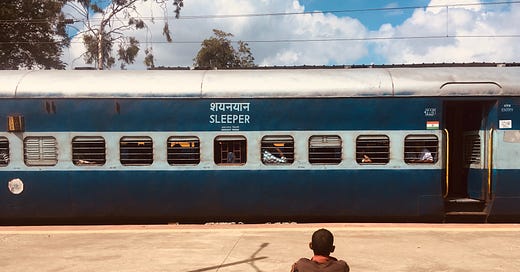The journey from where his parents worked to their home town took 28 hours. He loved the journeys, he looked forward to them and he remembered them fondly. There was time to kill and he killed a lot of time just looking out of the window. It was almost as good as reading. They often asked him what he was thinking about. He would mumble something by way of an answer but of course he had forgotten whatever it was, if there was anything.
INFLECTION BY AK KULSHRESHTH 34THPARALLEL MAGAZINE ISSUE 22
He had just started to get into the flow. His heels had been making steady thudding contact with the bitumen for some time now. It took a while for all systems to reconcile themselves to the fact that this was a long run. Not like a short clumsy shuffling sprint to catch a bus. There was a point of transition, a cusp, at which the protests of his joints started to get muted and an inertial force took over. He was quite slow—it took him an hour to do nine kilometres—but that was OK by him.
He had gotten up early to run along the canal-side track which started near Jervois Road. There were a few others on the track but it wasn’t crowded yet. He loved it when the flow happened. It made it all worth it: the suddenness of waking, the groping for the phone while it blared the bugler alarm tone, the pain in his left ankle when he started—everything. Not thinking about anything is incredibly difficult. But when he was in the flow, he often realized that he had spent time in a reverie. He could be staring at his feet plodding away or the Singaporean pastiche of greens, concrete, and steel which flowed past. He loved it when the things to his right and left organized themselves into streaming layers: one layer moving in the opposite direction, the next one moving with him, and then the next one opposite, and so on.
It reminded him of the time in his childhood in India looking out of train windows. The journey from where his parents worked to their home town took 28 hours. He loved the journeys, he looked forward to them and he remembered them fondly. But he would often wake up from dreams in which he got lost on a train.
His mother later told him that there was a saying that the water changed every kos, and the language every 20 koses. One kos is a bit more than three kilometres. Well, the scenery from the train window didn’t seem to him to change at all at any regular distance. But by the time the journey ended, they were in a completely different world. There were urban blots before and after the big stations of course—then, as now, most of the towns were ugly. But for most of the journey, the landscape was an irregular but neat matrix of fields with mud boundaries and trees in between. As the train rattled forward, the landscape organized itself into those blurred streams moving in opposite directions. The greens turned less lush and the colour of the mud changed from reddish to yellowish as they traveled further up North West. He imagined musical patterns in the chugging of the engine. When they crossed the large bridges the rhythm and melody changed abruptly.
There was time to kill and he killed a lot of time just looking out of the window. It was almost as good as reading. They often asked him what he was thinking about. He would mumble something by way of an answer but of course he had forgotten whatever it was, if there was anything.
When you grow up you need to do things when you’re not sleeping. You can’t do nothing for too long. You start to bend the rules to count things like watching TV as something. His Indian colleagues considered watching cricket while drinking beer the supreme sporting activity. The Singaporeans watched the English Premier League instead of cricket.




